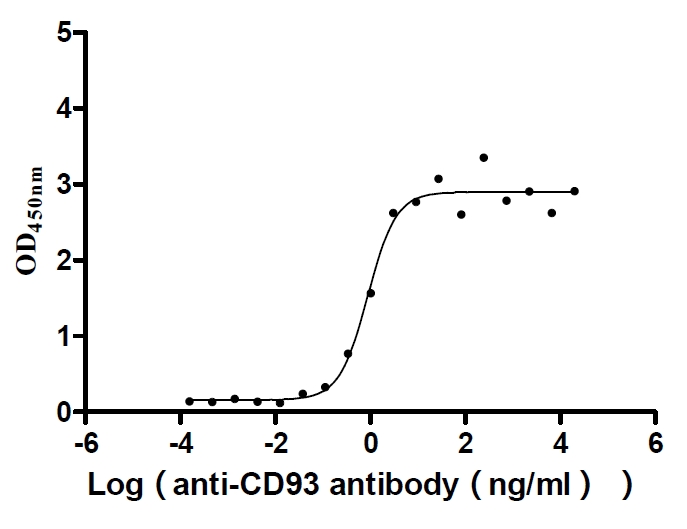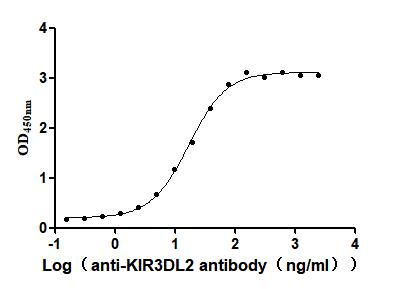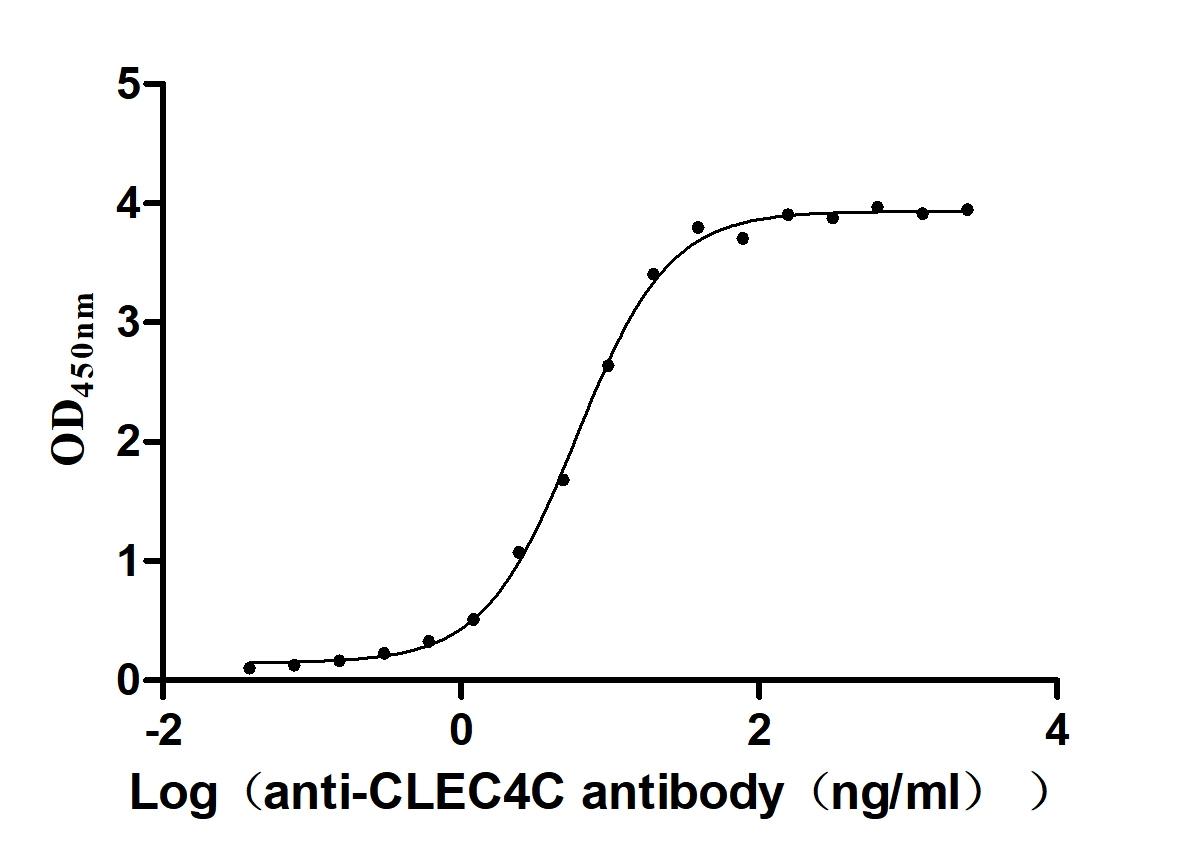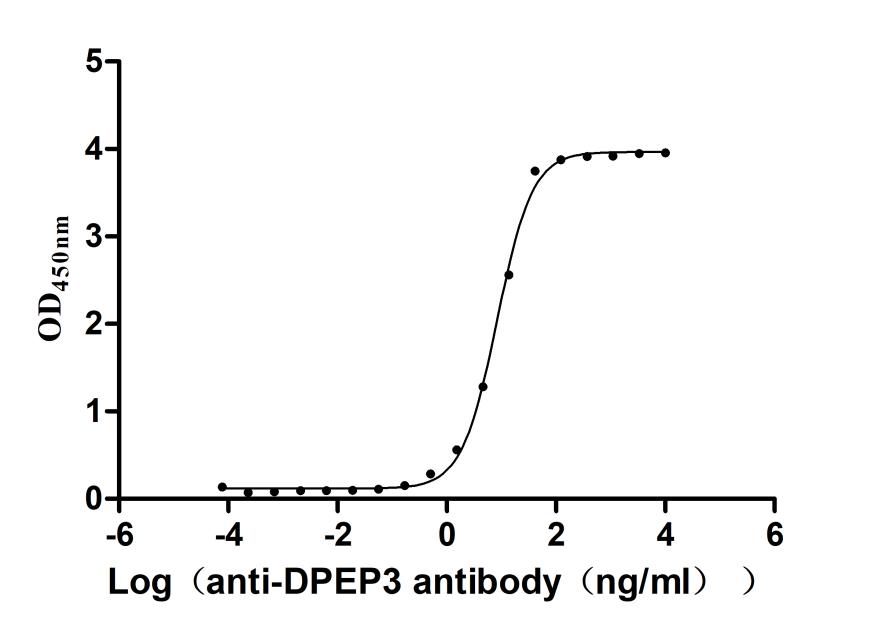Recombinant Human Procollagen C-endopeptidase enhancer 1 (PCOLCE)
-
货号:CSB-YP614881HU
-
规格:
-
来源:Yeast
-
其他:
-
货号:CSB-EP614881HU
-
规格:
-
来源:E.coli
-
其他:
-
货号:CSB-EP614881HU-B
-
规格:
-
来源:E.coli
-
共轭:Avi-tag Biotinylated
E. coli biotin ligase (BirA) is highly specific in covalently attaching biotin to the 15 amino acid AviTag peptide. This recombinant protein was biotinylated in vivo by AviTag-BirA technology, which method is BriA catalyzes amide linkage between the biotin and the specific lysine of the AviTag.
-
其他:
-
货号:CSB-BP614881HU
-
规格:
-
来源:Baculovirus
-
其他:
-
货号:CSB-MP614881HU
-
规格:
-
来源:Mammalian cell
-
其他:
产品详情
-
纯度:>85% (SDS-PAGE)
-
基因名:PCOLCE
-
Uniprot No.:
-
别名:PCOC1_HUMAN; Pcolce; PCOLE 1; PCOLE1; PCPE; PCPE-1; PCPE1; Procollagen C endopeptidase enhancer ; Procollagen C-endopeptidase enhancer 1; Procollagen C-endopeptidase enhancer; Procollagen C-proteinase enhancer 1; Procollagen COOH-terminal proteinase enhancer 1; procollagen, type 1, COOH-terminal proteinase enhancer; Type 1 procollagen C-proteinase enhancer protein; Type I procollagen COOH-terminal proteinase enhancer
-
种属:Homo sapiens (Human)
-
蛋白长度:Full Length of Mature Protein
-
表达区域:26-449
-
氨基酸序列QTPNY TRPVFLCGGD VKGESGYVAS EGFPNLYPPN KECIWTITVP EGQTVSLSFR VFDLELHPAC RYDALEVFAG SGTSGQRLGR FCGTFRPAPL VAPGNQVTLR MTTDEGTGGR GFLLWYSGRA TSGTEHQFCG GRLEKAQGTL TTPNWPESDY PPGISCSWHI IAPPDQVIAL TFEKFDLEPD TYCRYDSVSV FNGAVSDDSR RLGKFCGDAV PGSISSEGNE LLVQFVSDLS VTADGFSASY KTLPRGTAKE GQGPGPKRGT EPKVKLPPKS QPPEKTEESP SAPDAPTCPK QCRRTGTLQS NFCASSLVVT ATVKSMVREP GEGLAVTVSL IGAYKTGGLD LPSPPTGASL KFYVPCKQCP PMKKGVSYLL MGQVEENRGP VLPPESFVVL HRPNQDQILT NLSKRKCPSQ PVRAAASQD
-
蛋白标签:Tag type will be determined during the manufacturing process.
The tag type will be determined during production process. If you have specified tag type, please tell us and we will develop the specified tag preferentially. -
产品提供形式:Lyophilized powder
Note: We will preferentially ship the format that we have in stock, however, if you have any special requirement for the format, please remark your requirement when placing the order, we will prepare according to your demand. -
复溶:We recommend that this vial be briefly centrifuged prior to opening to bring the contents to the bottom. Please reconstitute protein in deionized sterile water to a concentration of 0.1-1.0 mg/mL.We recommend to add 5-50% of glycerol (final concentration) and aliquot for long-term storage at -20℃/-80℃. Our default final concentration of glycerol is 50%. Customers could use it as reference.
-
储存条件:Store at -20°C/-80°C upon receipt, aliquoting is necessary for mutiple use. Avoid repeated freeze-thaw cycles.
-
保质期:The shelf life is related to many factors, storage state, buffer ingredients, storage temperature and the stability of the protein itself.
Generally, the shelf life of liquid form is 6 months at -20°C/-80°C. The shelf life of lyophilized form is 12 months at -20°C/-80°C. -
货期:Delivery time may differ from different purchasing way or location, please kindly consult your local distributors for specific delivery time.Note: All of our proteins are default shipped with normal blue ice packs, if you request to ship with dry ice, please communicate with us in advance and extra fees will be charged.
-
注意事项:Repeated freezing and thawing is not recommended. Store working aliquots at 4°C for up to one week.
-
Datasheet :Please contact us to get it.
相关产品
靶点详情
-
功能:Binds to the C-terminal propeptide of type I procollagen and enhances procollagen C-proteinase activity.; C-terminal processed part of PCPE (CT-PCPE) may have an metalloproteinase inhibitory activity.
-
基因功能参考文献:
- Serum PCPE-1 might be used as a noninvasive marker of liver fibrosis in chronic hepatitis B. PMID: 29683980
- Results suggest that PCPE-1 binding to syndecans and/or fibronectin may control collagen fibril assembly on the cell surface. PMID: 25286301
- The analysis of the PCPE-1 interaction network based on Gene Ontology terms suggests that, besides its role in collagen deposition, PCPE-1 might be involved in tumour growth, neurodegenerative diseases and angiogenesis. PMID: 24117177
- The results of this study suggested that nuclear entrapment of PCOLCE and its extracellular depletion represents a novel molecular mechanism in late-onset muscle fibrosis. PMID: 23815790
- Procollagen C-proteinase enhancer grasps the stalk of the C-propeptide trimer to boost collagen precursor maturation. PMID: 23550162
- data generated by our system, support our hypothesis that combined data on PCPE concentration and isoforms may be useful for the diagnosis and follow-up of bone diseases PMID: 21569766
- Procollagen C-proteinase enhancer stimulates procollagen processing by binding to the C-propeptide region only. PMID: 21940633
- procollagen C-proteinase enhancer-1 (PCPE-1) binds to heparin/heparan sulfate and has a role in interaction with cells PMID: 20729553
- Role of the netrin-like domain of procollagen C-proteinase enhancer-1 in the control of metalloproteinase activity. PMID: 20207734
- Data show that only those containing both PCPE1 CUB1 and CUB2 were capable of enhancing BMP-1 activity and binding to a mini-procollagen substrate with nanomolar affinity. PMID: 19801683
- PCPE binds to sites on either side of the procollagen cleavage site, thereby facilitating the action of procollagen C-proteinases. PMID: 12105202
- PCPE1 and PCPE2 were found to be collagen-binding proteins, capable of binding at multiple sites on the triple helical portions of fibrillar collagens and also capable of competing for such binding with procollagen C-proteinases PMID: 12393877
- procollagen C-proteinase enhancer is an elongated multidomain glycoprotein as shown by small angle x-ray scattering PMID: 12486138
- the three-dimensional structure of the NTR domain of human PCOLCE1 is the first example of a structural domain with the canonical features of an NTR module PMID: 12670942
- chordinase activity of BMP1 is not enhanced by PCPE-1 PMID: 15817489
- tolloid-like 1 binds procollagen C-proteinase enhancer protein 1 and differs from bone morphogenetic protein 1 in the functional roles of homologous protein domains PMID: 16507574
- PCPE-stimulating activity requires a calcium binding motif in the CUB1 domain that is highly conserved among CUB-containing proteins PMID: 17446170
- in bone fracture patients, 12 proteins were related to bone/cartilage metabolism, including: TGF-beta induced protein IG-H(3), cartilage acidic protein 1, procollagen C proteinase enhancer protein and TGF-beta receptor III. PMID: 17602227
- PCPE-1 interacts with beta2-microglobulin (beta2-m) and may help initiate beta2-m amyloid fibril formation in connective tissues PMID: 18164932
- Procollagen I mRNA expression was decreased by synovial fluid from patients with prosthesis loosening. PMID: 18350290
- the sPCPE1 glycopattern appears to be associated with the physiological and pathological states of bone PMID: 19361460
显示更多
收起更多
-
亚细胞定位:Secreted.
-
数据库链接:
HGNC: 8738
OMIM: 600270
KEGG: hsa:5118
STRING: 9606.ENSP00000223061
UniGene: Hs.202097
Most popular with customers
-
Recombinant Severe acute respiratory syndrome coronavirus 2 Spike glycoprotein (S), partial (Active)
Express system: Mammalian cell
Species: Severe acute respiratory syndrome coronavirus 2 (2019-nCoV) (SARS-CoV-2)
-
Recombinant Rat Intestinal-type alkaline phosphatase 1 (Alpi) (Active)
Express system: Mammalian cell
Species: Rattus norvegicus (Rat)
-
Recombinant Mouse Claudin-18 (Cldn18)-VLPs (Active)
Express system: Mammalian cell
Species: Mus musculus (Mouse)
-
Recombinant Human Microtubule-associated protein tau (MAPT) (Active)
Express system: Mammalian cell
Species: Homo sapiens (Human)
-
Recombinant Human Complement component C1q receptor (CD93), partial (Active)
Express system: Mammalian cell
Species: Homo sapiens (Human)
-
Recombinant Human Killer cell immunoglobulin-like receptor 3DL2 (KIR3DL2), partial (Active)
Express system: Mammalian cell
Species: Homo sapiens (Human)
-
Recombinant Macaca fascicularis C-type lectin domain family 4 member C(CLEC4C), partial (Active)
Express system: Mammalian cell
Species: Macaca fascicularis (Crab-eating macaque) (Cynomolgus monkey)
-
Recombinant Macaca fascicularis Dipeptidase 3(DPEP3) (Active)
Express system: Mammalian cell
Species: Macaca fascicularis (Crab-eating macaque) (Cynomolgus monkey)


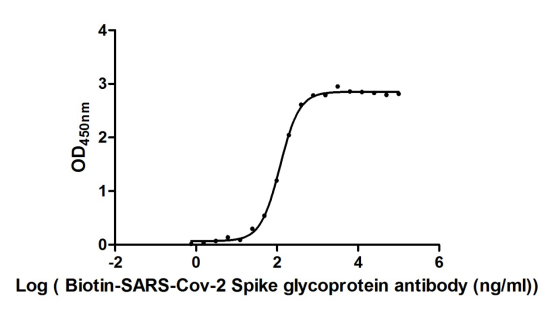

-AC1.jpg)
-AC1.jpg)
